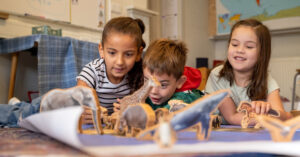How Learning Hubs Use Role-Playing Activities to Develop Leadership Skills in Kids

Leadership isn’t something you can learn solely from a textbook. It’s a skill that grows from real-world experience, trial and error, and practicing how to handle different situations. So, how do we help kids develop leadership skills in an environment where they can learn through experience? The answer lies in something fun and dynamic role-playing activities.
Learning hubs, like Dreamtime Learning Hub, are increasingly using role-playing as an educational tool to cultivate leadership skills in children. By encouraging students to step into different roles, these hubs create safe and engaging spaces for kids to practice decision-making, problem-solving, communication, and teamwork—core elements of strong leadership.
Here’s how role-playing is helping students grow into the confident, empathetic leaders of tomorrow.
Learning Through Imagination and Action
Kids naturally love to pretend and imagine. Whether they’re playing house, pretending to be astronauts, or running a mock restaurant, role-playing taps into their creativity and sense of fun. But behind this imaginative play lies something much more powerful – an opportunity to practice leadership skills in real-world scenarios.
At Dreamtime Learning Hub, role-playing activities are carefully designed to place students in leadership roles. Whether it’s being the “manager” of a group project, the “CEO” of a mock company, or the “team leader” of a community initiative, kids experience what it’s like to take charge, delegate tasks, and make decisions.
These activities allow students to explore leadership in a way that feels natural and exciting, helping them develop confidence in their abilities without the pressure of a formal setting.
Building Confidence Through Role Reversals
One of the best things about role-playing is that it gives kids the chance to step outside their usual comfort zones. For example, a child who’s typically shy might be assigned the role of a group leader in a debate, while a more outspoken child might take on the role of a mediator or listener. This switch-up helps kids discover new strengths and gives them the chance to practice different aspects of leadership.
At Dreamtime Learning Hub, we’ve seen how this can transform students. A child who never saw themselves as a leader may suddenly shine when given the opportunity to guide others in a creative role-play scenario. This shift not only builds their confidence but also opens their eyes to their potential as a leader.
Developing Critical Thinking and Problem-Solving
Leadership isn’t just about being in charge – it’s about making informed decisions and solving problems effectively. Role-playing activities often put kids in situations where they need to think critically and come up with solutions on the spot. Whether they’re navigating a crisis in a simulated business environment or mediating a disagreement between team members, these scenarios encourage kids to think on their feet.
In a Dreamtime Learning Hub role-play, for example, students might be tasked with organizing a school event, working through the challenges of budgeting, team coordination, and problem-solving along the way. Through these experiences, students develop essential leadership skills like resourcefulness, decision-making, and adaptability.
Fostering Teamwork and Empathy
Strong leaders aren’t just confident and decisive – they’re also empathetic and good listeners. Role-playing activities in learning hubs emphasize the importance of collaboration and understanding different perspectives. By stepping into different roles, children gain insight into the experiences of others, whether they’re playing the role of a team member, a customer, or a peer with a different viewpoint.
This experience helps children develop empathy, which is a key component of effective leadership. Leaders who understand and consider the perspectives of others are better equipped to motivate and inspire their teams. At Dreamtime Learning Hub, role-playing activities often involve group discussions, where students learn how to listen to their peers, appreciate diverse opinions, and make decisions that benefit the whole group.
Practicing Communication Skills
Leadership is all about communication – whether it’s giving clear instructions, offering feedback, or motivating a team. Role-playing activities provide a structured environment where kids can practice these communication skills in a variety of situations. They might be tasked with presenting an idea to their peers, leading a group discussion, or mediating a conflict between classmates.
At Dreamtime Learning Hub, role-playing often involves public speaking elements, where students are encouraged to communicate their thoughts and ideas confidently. Over time, this practice helps kids become more articulate, persuasive, and effective communicators – all key qualities of a strong leader.
Encouraging Resilience and Decision-Making
One of the most valuable leadership lessons kids learn through role-playing is resilience. In any leadership role, challenges and setbacks are inevitable. Role-playing activities allow students to experience the ups and downs of leadership in a safe, supportive environment. Whether they’re faced with a tough decision, a team disagreement, or an unexpected twist in a role-play scenario, they learn how to navigate challenges with patience and perseverance.
For example, Dreamtime Learning Hub might simulate a “business crisis” where students must quickly adapt their strategies and work together to find a solution. These experiences help students build resilience, learning that leadership involves staying calm under pressure and being willing to adapt when things don’t go according to plan.
Why Dreamtime Learning Hub Uses Role-Playing
At Dreamtime Learning Hub, we believe that leadership is a skill that can – and should – be developed from an early age. Role-playing activities allow us to nurture these skills in a way that’s fun, engaging, and impactful. Through role-play, students not only develop essential leadership skills like confidence, communication, and problem-solving, but they also learn how to lead with empathy and resilience.
By giving students the chance to take on leadership roles in a variety of scenarios, we help them see themselves as capable leaders and prepare them for future challenges. Our goal is to ensure that every student leaves Dreamtime Learning Hub with the skills, mindset, and confidence to lead in whatever path they choose.
Empowering the Leaders of Tomorrow
In a world that increasingly values collaboration, adaptability, and emotional intelligence, leadership skills are more important than ever. Through role-playing activities at learning hubs like Dreamtime, students are given the tools to develop these skills early on, setting them up for success both academically and in life.
So, if you’re looking for a program that will help your child grow into a confident, capable leader, consider the power of role-playing in developing leadership skills. Visit Dreamtime Learning Hub to learn more about how we use innovative techniques to empower the leaders of tomorrow.
Let's Talk
Share this Articles




